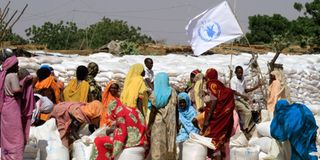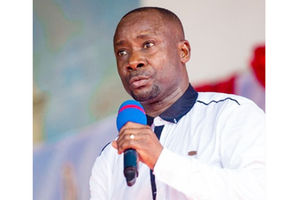World Food Programme wins Nobel Peace Prize

In this file photo taken on November 06, 2014 Sudanese displaced women collect humanitarian aid supplies provided by the UN's World Food Program, in the Kalma camp for internally displaced people (IDP) located east of Nyala city in Sudan's Darfur. AFP PHOTO
What you need to know:
"With this year's award, the Norwegian Nobel Committee wishes to turn the eyes of the world towards the millions of people who suffer from or face the threat of hunger," Nobel committee chairwoman Berit Reiss-Andersen said on unveiling the winner in Oslo.
The World Food Programme won the Nobel Peace Prize on Friday for its efforts to combat hunger and improve conditions for peace in conflict areas, the Nobel committee said.
"With this year's award, the Norwegian Nobel Committee wishes to turn the eyes of the world towards the millions of people who suffer from or face the threat of hunger," Nobel committee chairwoman Berit Reiss-Andersen said on unveiling the winner in Oslo.
The WFP was honoured for "its efforts to combat hunger, for its contribution to bettering conditions for peace in conflict-affected areas and for acting as a driving force in efforts to prevent the use of hunger as a weapon of war and conflict," the jury said
Whether delivering food by helicopter or on the back of an elephant or a camel, the WFP prides itself on being "the leading humanitarian organisation" in a world where, by its own estimates, some 690 million people -- one in 11 -- go to bed on an empty stomach.
Founded in 1961, the UN organisation helped 97 million people last year, distributing 15 billion rations to people in 88 countries last year.
The statistics are dizzying but only a fraction of the total number in need.
Despite making progress over the past three decades, the UN's goal to eradicate hunger by 2030 appears out of reach if current trends continue, according to experts.
Women and children are usually those most at risk.
The Nobel prize -- which consists of a gold medal, a diploma and a cheque for 10 million Swedish kronor ($1.1 million, 950,000 euros) -- will be presented to the winner on December 10, the anniversary of the 1896 death of Swedish industrialist and philanthropist Alfred Nobel, who created the awards in his will.
Depending on the coronavirus restrictions in place at the time, it will either be awarded in-person at a scaled-back ceremony in Oslo, or remotely in an online ceremony.
Full list of Nobel Peace Prize winners
Here is the full list of Nobel Peace Prize laureates from 1901, when the prize was first awarded.
This year's prize went on Friday to the World Food Programme for its work to combat hunger and foster peace.
2020: The United Nation's World Food Programme (WFP)
2019: Abiy Ahmed (Ethiopia)
2018: Denis Mukwege (DR Congo) and Nadia Murad (Iraq)
2017: International Campaign to Abolish Nuclear Weapons (ICAN)
2016: Juan Manuel Santos (Colombia)
2015: The National Dialogue Quartet (Tunisia)
2014: Kailash Satyarthi (India) and Malala Yousafzai (Pakistan)
2013: The Organisation for the Prohibition of Chemical Weapons (OPCW)
2012: The European Union (EU)
2011: Ellen Johnson Sirleaf and Leymah Gbowee (Liberia), Tawakkul Karman (Yemen)
2010: Liu Xiaobo (China)
2009: Barack Obama (US)
2008: Martti Ahtisaari (Finland)
2007: Al Gore (US) and the UN Intergovernmental Panel on Climate Change
2006: Muhammad Yunus (Bangladesh) and the Grameen Bank
2005: International Atomic Energy Agency and Mohamed ElBaradei (Egypt)
2004: Wangari Maathai (Kenya)
2003: Shirin Ebadi (Iran)
2002: Jimmy Carter (US)
2001: Kofi Annan (Ghana) and the United Nations
2000: Kim Dae-jung (South Korea)
1999: Medecins Sans Frontieres (Doctors Without Borders)
1998: John Hume and David Trimble (Northern Ireland)
1997: Jody Williams (US) and the International Campaign to Ban Landmines
1996: Carlos Filipe Ximenes Belo and Jose Ramos-Horta (East Timor)
1995: Joseph Rotblat (Britain) and the Pugwash movement
1994: Yitzhak Rabin, Shimon Peres (Israel) and Yasser Arafat (PLO)
1993: Nelson Mandela and Frederik de Klerk (South Africa)
1992: Rigoberta Menchu (Guatemala)
1991: Aung San Suu Kyi (Burma)
1990: Mikhail Gorbachev (Soviet Union)
1989: Dalai Lama (Tibet)
1988: United Nations Peacekeeping Forces
1987: Oscar Arias Sanchez (Costa Rica)
1986: Elie Wiesel (US)
1985: International Physicians for the Prevention of Nuclear War
1984: Desmond Tutu (South Africa)
1983: Lech Walesa (Poland)
1982: Alva Myrdal (Sweden) and Alfonso Garcia Robles (Mexico)
1981: Office of the United Nations High Commissioner for Refugees
1980: Adolfo Perez Esquivel (Argentina)
1979: Mother Teresa (Albania)
1978: Anwar Sadat (Egypt) and Menachem Begin (Israel)
1977: Amnesty International
1976: Betty Williams (Britain) and Mairead Corrigan (Northern Ireland)
1975: Andrei Sakharov (Soviet Union)
1974: Sean MacBride (Ireland) and Eisaku Sato (Japan)
1973: Henry Kissinger (US) and Le Duc Tho (Vietnam, declined)
1972: prize not handed out
1971: Willy Brandt (Germany)
1970: Norman Borlaug (US)
1969: International Labour Organisation
1968: Rene Cassin (France)
1967: prize not handed out
1966: prize not handed out
1965: United Nations Children's Fund (UNICEF)
1964: Martin Luther King Jr (US)
1963: International Committee of the Red Cross and the League of Red Cross Societies
1962: Linus Carl Pauling (US)
1961: Dag Hammarskjoeld (Sweden)
1960: Albert Lutuli (South Africa)
1959: Philip Noel-Baker (Britain)
1958: Georges Pire (Belgium)
1957: Lester Pearson (Canada)
1956: prize not handed out
1955: prize not handed out
1954: Office of the United Nations High Commissioner for Refugees
1953: George Marshall (US)
1952: Albert Schweitzer (France)
1951: Leon Jouhaux (France)
1950: Ralph Bunche (US)
1949: Lord (John) Boyd Orr of Brechin (Britain)
1948: prize not handed out
1947: Friends Service Council (The Quakers), American Friends Service Committee (The Quakers)
1946: Emily Greene Balch (US), John Raleigh Mott (US)
1945: Cordell Hull (US)
1944: International Committee of the Red Cross
1943: prize not handed out
1942: prize not handed out
1941: prize not handed out
1940: prize not handed out
1939: prize not handed out
1938: Nansen International Office for Refugees
1937: Viscount Cecil of Chelwood (Britain)
1936: Carlos Saavedra Lamas (Argentina)
1935: Carl von Ossietzky (Germany)
1934: Arthur Henderson (Britain)
1933: Sir Norman Angell (Ralph Lane) (Britain)
1932: prize not handed out
1931: Jane Addams (US) and Nicholas Murray Butler (US)
1930: Nathan Soederblom (Sweden)
1929: Frank Billings Kellogg (US)
1928: prize not handed out
1927: Ferdinand Buisson (France) and Ludwig Quidde (Germany)
1926: Aristide Briand (France) and Gustav Stresemann (Germany)
1925: Sir Austen Chamberlain (Britain) and Charles Gates Dawes (US)
1924: prize not handed out
1923: prize not handed out
1922: Fridtjof Nansen (Norway)
1921: Karl Hjalmar Branting (Sweden) and Christian Lous Lange (Norway)
1920: Leon Victor Auguste Bourgeois (France)
1919: Thomas Woodrow Wilson (US)
1918: prize not handed out
1917: International Committee of the Red Cross
1916: prize not handed out
1915: prize not handed out
1914: prize not handed out
1913: Henri La Fontaine (Belgium)
1912: Elihu Root (US)
1911: Tobias Michael Carel Asser (The Netherlands) and Alfred Hermann Fried (Austria)
1910: Permanent International Peace Bureau
1909: Auguste Marie Francois Beernaert (Belgium) and Paul Henri Benjamin Balluet, Baron d'Estournelles de Constant de Rebecque (France)
1908: Klas Pontus Arnoldson (Sweden) and Fredrik Bajer (Denmark)
1907: Ernesto Teodoro Moneta (Italy) and Louis Renault (France)
1906: Theodore Roosevelt (US)
1905: Baroness Bertha Sophie Felicita von Suttner (Austria)
1904: Institute of International Law
1903: William Randal Cremer (Britain)
1902: Elie Ducommun (Switzerland) and Charles Albert Gobat (Switzerland)
1901: Jean Henri Dunant (Switzerland) and Frederic Passy (France)




